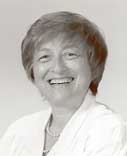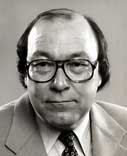Marilynn Rosenthal
When Marilynn Rosenthal’s son died in the Sept. 11, 2001, attack on the World Trade Center, the U-M-Dearborn professor emerita of sociology turned her research toward terrorism.

“She was interested in learning, intellectually, what happened,” says her daughter, Helen, according to the Detroit News.
Rosenthal, who was almost finished with a book about the terror attack, died Aug. 9 of cancer. She was 77 years old.
She also created the Josh Rosenthal Lecture Series in memory of her son. This year’s speech on Sept. 11 will feature Larry Cox, executive director of Amnesty International USA, in a talk on global human rights.
For more than a decade, Rosenthal served as director of the Health Policy Studies program at U-M-Dearborn, and as associate director of the U-M Medical School Society and Medicine Program. She had coordinated the Forum on Health Policy since 1994 and was part of the medical school liberal arts program for premedical students.
“Her participation in the academic life of both the Ann Arbor and Dearborn campuses has made Professor Rosenthal an important link between the two campuses,” the Regents said in the announcement of her appointment to professor emerita in 2003. “Professor Rosenthal has maintained a superb program of research that has made her an internationally recognized expert in health care systems. She is widely published in the areas of medical mishaps and health policy issues and has received many honors and awards for her work.”
Rosenthal’s primary research interests were in comparative health care systems, physician self-regulation, and medical malpractice. Her research has been published in numerous books, journals and articles. She also had been a visiting scholar, fellow or professor at institutions such as Columbia University, Dartmouth University, Oxford University and Harvard University.
Rosenthal was active in organizing conferences and had been a long-standing member and a chair of the Medical Affairs Advisory Committee to the executive vice president for medical and health affairs. She also served on a variety of other university committees.
She received numerous awards, including the Michigan Association of Governing Bodies Distinguished Faculty Award, the U-M-Dearborn Distinguished Faculty Research Award, and the Faculty Recognition Award for her research, service and teaching. Her book “The Incompetent Doctor” won a 1995 Baxter Distinguished Submission Award. In 2002, Rosenthal received the Faculty Member of the Year Award from U-M-Dearborn’s Alumni Society.
Rosenthal earned a bachelor’s degree at Wayne State University and her master’s and doctoral degrees at U-M in Ann Arbor. She joined the U-M-Dearborn faculty as an assistant professor in 1976 and was promoted to associate professor in 1982 and professor in 1988. In 2002 she was appointed adjunct professor of internal medicine.
Survivors include her daughter, Helen; son-in-law Carmen Marino; and her grandchildren, Madeleine and Alexandra.
A memorial service took place Aug. 19 at the Michigan League in Ann Arbor.
Jack Kostyo
Jack Kostyo, professor emeritus in internal medicine, dedicated his life to improving medical education and helping people with diabetes and growth problems. He died of brain cancer April 1 in Ann Arbor. Kostyo was 75.

In his career, Kostyo was a leading pioneer and educator in physiology and endocrinology. He earned a bachelor’s degree in zoology and fine arts from Oberlin College, then earned a Ph.D. in zoology at Cornell University in 1957. Before joining U-M in 1979, he served as a post-doctoral fellow at Harvard Medical School, then taught at Duke University and Emory University.
U-M recruited Kostyo in 1979 as professor and chairman of the physiology department. During his tenure, Kostyo introduced computers, modernizing the department. Using his teaching experience, Kostyo created a new physiology curriculum for the Medical School. He became president of the Association of Physiology Department Chairmen and served with the National Board of Medical School Examiners, the entity creating qualifying board exams for physicians. He also was editor-in-chief of Endocrinology 1979-82.
In 1985 Kostyo began full-time research, and in 1986 became associate director and chief of biomedical research at the Michigan Diabetes Research and Training Center (MDRTC). During the next 10 years he became a scientific advisor to Genentech Inc., later serving as a consultant for a variety of other pharmaceutical companies.
Kostyo’s contributions led to new drug development for diabetes, metabolism disorders and juvenile growth problems. He became professor emeritus of physiology in 1995 and continued work as active professor emeritus in internal medicine. Using his research and administrative experience, he served as director of grants at MDRTC managing funds distribution to U-M faculty investigating diabetic, endocrine and metabolic disorders. He remained active until 2006.
Kostyo was an influential scientist who helped the medical world understand the function of human growth hormone and hormone regulation at the cellular level, family members say. His research and significant discoveries led to safe therapeutic treatment of growth disorders without health-compromising side effects.
Kostyo is survived by his wife Shirlianne; daughter Cecile (Alister) Kostyo Bazaz of Marietta, Ga.; son Louis of Prescott, Ariz.; and granddaughter Kathleen Wray Bazaz. Burial took place in Courtyard A and Washtenong Memorial Park in Ann Arbor. A memorial was held June 9 at the Campus Inn. The family requests donations be made to Arbor Hospice and the American Diabetes Association.
— Submitted by Louis and Shirlianne Kostyo
Pauline Sherman
Pauline Sherman, professor emerita of aerospace engineering, died Aug. 17 in Berkeley, Calif. She has the distinction of being the first woman to be appointed as a professor in the College of Engineering at the University.
Many of her former students, and people both within and outside the University community, have fond memories of Sherman, and she will be sorely missed, says former colleague, Martin Sichel, professor emeritus of aerospace engineering.
Sherman was born in New York City Aug. 27, 1921. Her parents were immigrants from Russia. In 1952 she received a B.S.E. degree in engineering mechanics from the University, and in 1953 she earned an M.S.E. degree in mechanical engineering at the University of California, Berkeley, where she also worked as a research engineer.
In 1956 Sherman returned to U-M as an associate research engineer at the Department of Aerospace Engineering and worked on problems in hypersonic flow and other related research. She joined the department as an assistant professor in 1960; becoming the first woman faculty member in the College of Engineering. Her research work was outstanding, colleagues say, and she was promoted to associate professor in 1963 and professor in 1971.
Sherman taught both theoretical and laboratory courses in aerodynamics and propulsion. She conducted fundamental research in jet noise, low-density flows, two-phase flows and especially hypersonic flows. She was supervisor for the design and construction of a hypersonic “hot-shot” wind tunnel. This involved a great deal of responsibility because of the high energies involved. At the time this wind tunnel was completed it was a unique facility in the country.
In addition to her academic responsibilities, Sherman presented lectures on hypersonic facilities in Europe on a NATO-AGARD lecture tour. She also consulted with the Environmental Protection Agency and the Lawrence Livermore Berkeley Laboratories. She also served on the Advisory Committee for Women in Science. She was elected to serve on Michigan Faculty Assembly, the Rackham Graduate School Science Board and the Faculty Senate Advisory Review Committee. After her retirement in 1987, Sherman did volunteer work for the American Civil Liberties Union.
Her husband, Noah Sherman, was a professor of physics at U-M and preceded her in death.
— Submitted by Martin Sichel, College of Engineering

